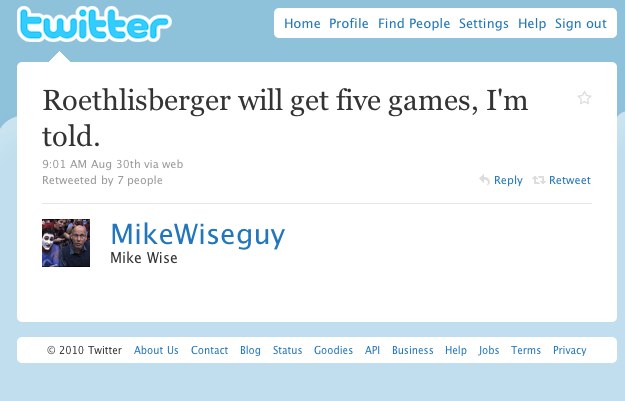WashPost's tweet blunder highlights power of Twitter, microblogging

Plenty of people out there still think of Twitter as somewhat of a joke, a quick 140-character excuse to spread meaningless information. But a Washington Post sports reporter who tried to prove a point about the credibility of the medium by intentionally tweeting misinformation has found himself on the hot seat for his own lapse in judgement.
Mike Wise, a former New York Times columnist who joined the Post in 2004, intentionally tweeted last week incorrect information about Pittsburgh Steelers quarterback Ben Roethlisberger, who is facing a six-game suspension, as part of an experiment for his radio show. Instead, the test backfired and The Post's editors - not amused with Wise for being so loose with the newspaper's credibility - suspended him for one month.
For the sake of disclosure, Wise and I were former colleagues at The Post and knew each other well enough that he once attended a dinner party at my home. He's a good guy, a respected journalist and an authority on his beat. But he made a bad call - and now he's working on restoring his credibility.
In the meantime, his fumble may turn out to be Twitter's gain. His experiment proved that there is legitimacy - and dare I say a form of microjournalism - that exists on Twitter. Wise and any other writer who attaches himself to the name of a respected and trusted news outlet is a part of that legitimacy. I like to consider myself and my colleagues here at ZDNet to be a part of that group.
Granted, I often write posts based on what another outlet has written - which is the case here - but always give credit where credit is due. I first read about this on CNET and also saw it on a CNN video. I trust both of those sources and admit that I did not call the Post to confirm the suspension (plus, it was in The Post, as was Wise's own statement.)
With so noise much being spewed on Twitter, it's important to remember that the user has control of the volume dial. I follow a lot of trusted sources - national, local and beat specific. at any given moment, I may see a flash (in the form of a Tweetdeck pop-up) that alerts me to everything from a fire in the nearby foothills to a boy in Colorado being carried away by a homemade hot air balloon. It was how I learned of Michael Jackson's death, that an airplane had crash landed in the Hudson River and that HP CEO Mark Hurd had resigned.
Had some random Joe on Twitter blasted those messages, I probably wouldn't have given any of them a second thought. OK, maybe I would have - but I would have had my doubts. But each of those tweets came from trusted sources - and in each of those instances, I stopped what I was doing to search for more information.
Microjournalism is doing its micro-job: it's informing. And while few of these tweets come with any actual details, most come with a link to direct me to more information.
As a service, that's very powerful.
